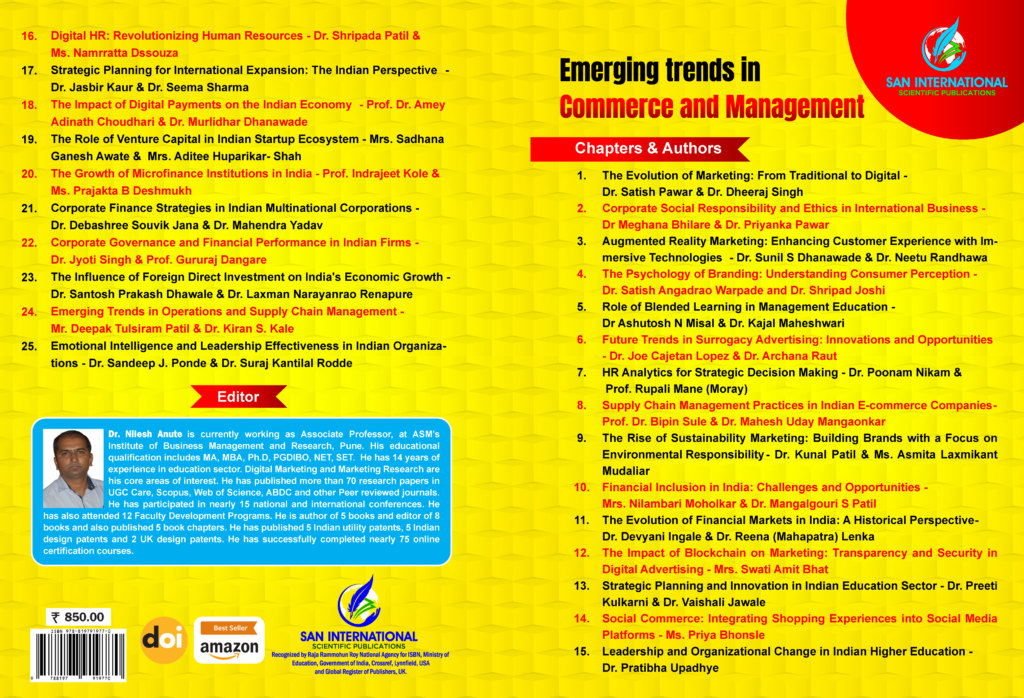Book Title: Emerging Trends in Commerce and Management
Editor: Dr. Nilesh Anute
ISBN: 978-81-979197-7-0
Chapter: 25
DOI: https://doi.org/10.59646/emc25/255
Authors:
Dr. Sandeep J. Ponde, Associate Professor, NCRD’s Sterling Institute of Management Studies, Nerul, Navi Mumbai, Maharashtra, India.
Dr. Suraj Kantilal Rodde, Associate Professor, Vidya Bharati Mahavidyalaya, Amravati, Maharashtra, India.
Learning Objectives
This chapter seeks to thoroughly examine the correlation between emotional intelligence (EI) and leadership performance in Indian organisations, organised around five primary learning objectives. Firstly, emotional intelligence is defined as a complex concept that includes self-awareness, self-regulation, motivation, empathy, and social skills. It is imperative for leaders to comprehend and control their own emotions while skillfully manoeuvring through interpersonal interactions. Furthermore, the chapter examines the influence of emotional intelligence (EI) on leadership. It illustrates how leaders who possess emotional intelligence are able to employ different leadership styles, such as transformational and transactional leadership, more efficiently. As a result, this improves the overall performance of the organisation. Additionally, it assesses the cultural milieu, recognising the impact of Indian cultural values, traditions, and social conventions on the growth and manifestation of emotional intelligence in leadership. An knowledge of this cultural perspective is essential for comprehending the distinct difficulties and advantages that exist in Indian organisational environments. Additionally, the chapter examines and assesses several approaches to cultivating emotional intelligence (EI) in leaders, such as specialised training programmes, mentorship, coaching, and self-assessment tools. These tactics are crucial for developing emotionally intelligent leaders who have the ability to initiate good organisational transformation.
References
- Salancik, G. (1977). Commitment is too easy! Organizational Dynamics, 6: 62-80. Salovey, P., & Mayer, J. D. (1990). Emotional intelligence. Imagination Cognition and Personality, 9(3), 185-211.
- Schutte, N.S., Malouff, J.M., Hall, L.E., Simunek, M., McKenley, J. & Hollander, S. (2002). Characteristics emotional intelligence and emotional well-being, Cognition and Emotion, 16: 7699-785
- Scott-Ladd, B., Travaglione, A. and Marshall, V. (2006). Causal inferences between participation in decision making, task attributes, work effort, rewards, job satisfaction and commitment. Leadership & Organization Development Journal, 27(5), 399-414.
- Sommers, M.J. (1995) Organizational commitment, turnover and absenteeism: an examination of direct and interaction effects. Journal of Organizational Behavior, 16:49-58
- Sy T. and Cote S. (2003). Emotional intelligence: A key ability to succeed in the matrix organization, Journal of Management Development, Vol. 23 No. 5, 2004, pp. 437-455
- Sy, T., & Cote, S. (2004). Emotional intelligence: A key ability to succeed in the matrix organization, Journal of Management Development, 23: 437-455.
- Tichy, N.M. & Devanna, M.A.(1986). The Transformational Leader. New York: Addison Wiley. Vakola et al., 2004 M. Vakola, I. Tsaousis, I. Nikolaou The role of emotional intelligence and personality variables on attitude toward organizational Change Journal of Managerial Psychology, 19 (2004), pp. 88–110
- Williams, L. J. & Hazer, J. T. (1986). Antecedents and consequences of satisfaction and commitment in turnover models: a re-analysis using latent variable structural equation methods. Journal of Applied Psychology, 72(1), 219-31.

